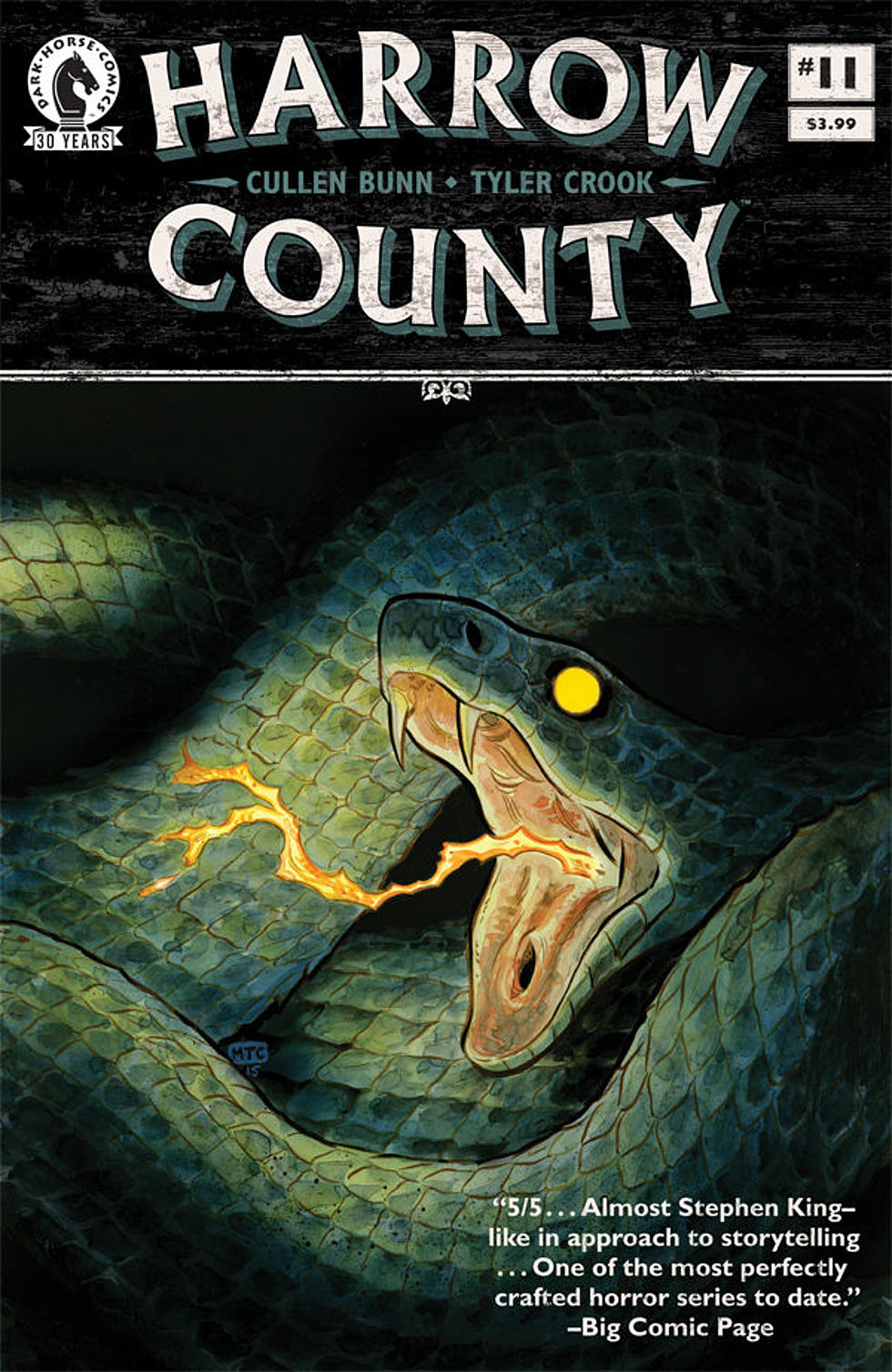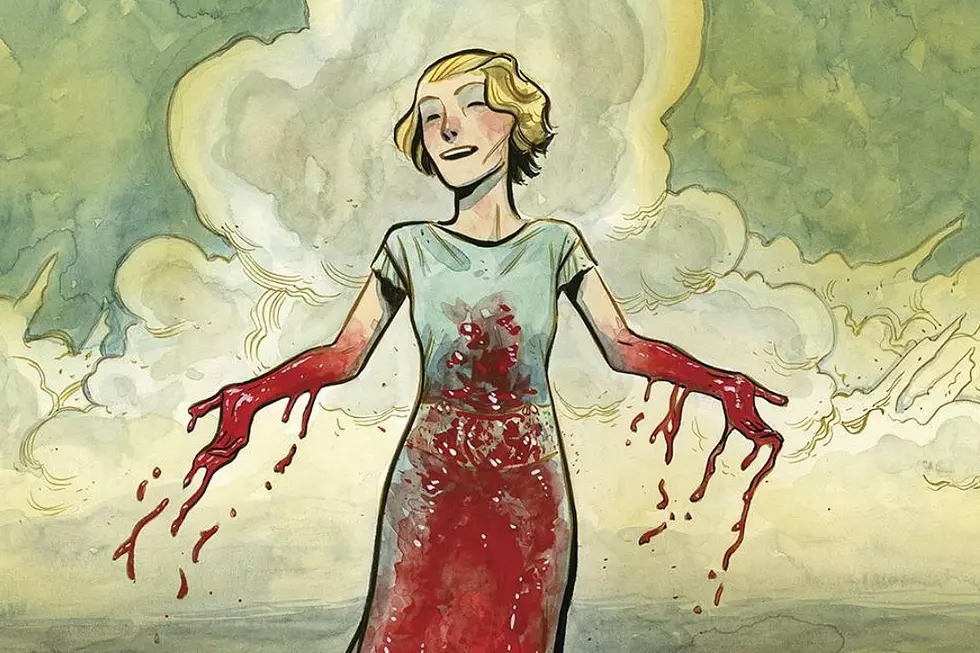
Love Every Part Of Making Comics: Tyler Crook On His Art Process For ‘Harrow County’
Last year Tyler Crook, artist on Harrow County at Dark Horse with writer Cullen Bunn, shared a series of process videos with ComicsAlliance, breaking down his pencilling, inking, and coloring as three time-lapse videos, and offering a look at just how he constructs a page --- and just how long it takes for a book like Harrow County to come to life.
With issue #11 of the series in stores now, Crook has returned to record another video of his artistic process --- and this time round, ComicsAlliance spoke to him about his work on the series, looking particularly at his working life as an artist. What's it like to be at that desk for hours on end, every day, and how does he approach an ongoing story like the dark, woodland horror of Harrow County?
ComicsAlliance: How long would you say you typically spend on each page, and what part of the process takes longest for you?
Tyler Crook: Each page takes between a day and a half, and two days. It can be hard to gage sometimes, because I pencil an entire issue and then I ink the entire issue and then color the whole thing. So it's usually several weeks from the time i start penciling a page until I finish it. All the different parts seem to take roughly the same amount of time.
CA: Which part of putting a page together do you most enjoy? Which part seems to fly by, and which parts are harder to get through, day-to-day?
TC: I love every part of making comics! So it's hard to pick a favorite part of the process. Today I kinda feel like inking would be fun --- but ask me tomorrow and I'l probably give you a different answer. Layouts are the hardest part but they are still pretty enjoyable. I don't much care for scanning pages... but I think that's because it doesn't feel like making comics. It feels like I'm sitting around waiting for my computer.
There's also a lot of stress involved in scanning because I'm also checking all the pages to make sure I'm actually done - and I just know that some kind of mistake will sneak past me!
CA: Do you have a set routine for your day? Do you have preset goals, targets, or do you take each day as it comes?
TC: Yes! Starting a day without a plan is a surefire way to waste my time. When I'm working on actual comics pages, I'll try to finish three things in a day. So, for example, I'll pencil three pages in a day; or ink three pages; or color three pages. But I also plan extra days to pick up the slack because inevitably one day a week goes completely off the rails and I don't hit my goals.
I try to be at my desk working by 10am and I stop when I either hit my goal for the day, or when 10pm rolls around. I usually work between ten and twelve hours per day, six days a week.
CA: Has your artistic routine changed at all over the years? Going from projects like Petrograd to B.P.R.D., and now Harrow County, do you see evolution in the way you approach a page, and then the process of actually creating it?
TC: The daily routine hasn't changed much. I've been keeping roughly the same hours for years now. But the process has changed a lot.
For one thing, nowadays I'm drawing, inking, coloring and lettering. The only thing I'm not doing is design and prepress. Sometime I think back on the good ol' days when I was drawing B.P.R.D. and I'd finish inking a page and I'd be done! I think it's important to keep the process evolving and not get stuck doing things the same way every time. At the very least I need to mix things up to keep myself excited about what I'm doing.
CA: Working at the desk all day must be hard on your hands, wrists, posture. Do you take steps to make sure you keep healthy, and protect yourself from stress injuries?
TC: Yes. I have a really good desk that tilts and goes up and down so I can switch between sitting and standing, and I have a crappy chair that I have dialled in so it's just right. And I take breaks every twenty minutes to stretch and refocus my eyes. It helps that I don't have to sit at a computer very often.
CA: Do you find that inking the page yourself gives you time to focus on where you want the sequence of the story to move? You seem to start off by focusing on the prominent, first features you want a reader to view, before moving to the next panel’s focus points.
TC: I don't think that inking has that that much of an effect on the final color pages. I think color can lead the eye a lot better than ink can. But if we were talking about a black and white book I'd say yes. However, I do think that doing all the different parts of the art myself makes a big difference. I think it makes the story telling feel a lot tighter because it's a single art vision, and there aren't conflicting ideas about how a panel or a page should work.
CA: By contrast, it feels like you color in reverse --- the brightest parts of the pages are the parts you cover last. Do you feel that is the case?
TC: That's interesting. I don't think so. In this video I worked a little differently than I normally do.
Usually I'll lay down sort of a color wash and then I'll paint all the flat colors on a page and then I'll go back in and add shadows and lighting. This page was a little weird because I decided not to ink the snakes in those jars. And the snakes took up most of the page! So I ended up jumping around a lot and just working on whatever seemed like would be fun at the time. Most of the page is colored in regular, transparent watercolor but at the end I use gouache (an opaque watercolor paint) to add any opaque details like the shines on the bottles, etc.
CA: Do you try and set a tone in the room while you work? The music in your videos gets us in the mindset for the tone of your storytelling --- do you listen to music, have your studio arranged in particular ways to allow you to really get into the mood?
TC: Aw, man! If I tried to set a tone in the studio that matched the pages I would go bananas! Listening to stuff that conjured a feeling a creeping dread all the time would be too much!
I try to keep things around me super chill and mellow. I like to listen to stuff that helps me keep my butt in my chair and working, so it ends up being mostly audiobooks and podcasts.
CA: Similarly, can it be hard to shake that off once you finish for the day? Do you sometimes find you carry Harrow County for a while after you’ve finished working, or is that mindset something you can switch off easily?
TC: I don't have a problem stepping out of the Harrow County world at the end of the day. The hard part is that my days can be pretty intense because I'm so focused on a single task for so many hours in a row. So that part can be hard to switch off when I'm done for the day. But flopping down on the couch and watching TV seems to chill me out pretty good!
Harrow County #11 is on sale now.
Check Out More Videos Of Tyler Crook At Work
More From ComicsAlliance
![R.L. Stine And German Peralta Rebuild A Monstrosity In ‘Man-Thing’ #1 [Preview]](http://townsquare.media/site/622/files/2017/02/Man-Thing_1_Featured.jpg?w=980&q=75)
![The Best Dark Horse Comics Covers of 2016 [Gallery]](http://townsquare.media/site/622/files/2017/01/featured.png?w=980&q=75)







